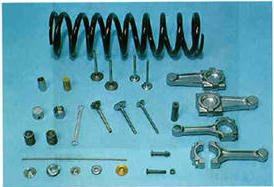Since titanium is a metal having the highest specific strength (tensile strength/density) and also having outstanding corrosion resistance, it is frequently used for important safety-related components of aircraft, for which corrosive resistance and reliability are absolutely necessary, chemical industry, seawater desalination equipment, food industry, and so on. This excellent corrosion resistance of titanium arises from the ultrathin passive film (TiO2) formed on the titanium surface. Recently, its use has also been expanding in medical-related areas because it is non-toxic to living bodies.
| Type | Characteristic value | Uses |
|---|---|---|
| JIS titanium class 1 | [Chemical composition] Titanium (Ti) 99.5% Oxygen (O) 0.15% or less [Mechanical properties] Tensile strength 245MPa or more (24.5kgf/mm2) |
- Various anode materials |
| JIS titanium class 2 | [Chemical composition] Titanium (Ti) 99.2% Oxygen (O) 0.20% or less [Mechanical properties] Tensile strength 350MPa or more (35 kgf/mm2) |
- Various chemical equipment and devices to handle chlorides, nitric acid, and organic acids |
| JIS titanium class 3 | [Chemical composition] Titanium (Ti) 99.1% Oxygen (O) 0.3% or less [Mechanical properties] Tensile strength 455MPa or more (45.5kgf/mm2) |
- Chemical process units |
| Ti-6Al-4V | [Chemical composition] Aluminum (Al) 6% Vanadium (V) 4% [Mechanical properties] Tensile strength 91MPa or more (9.1kgf/mm2) |
- Parts requiring high corrosion resistance and high strength, such as aircraft alloys, pump impellers, and steam turbine blades |

Titanium alloy-made automotive parts